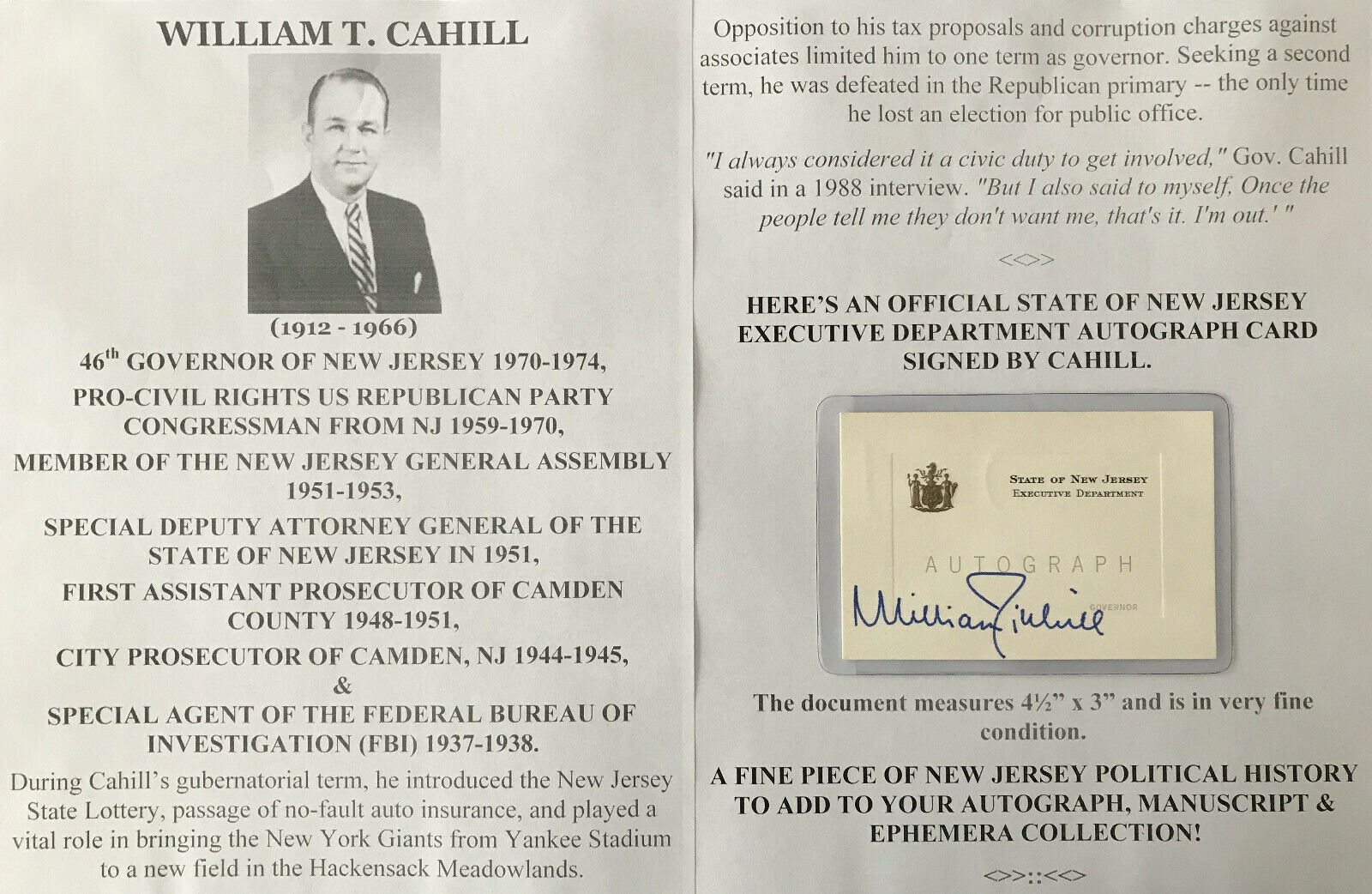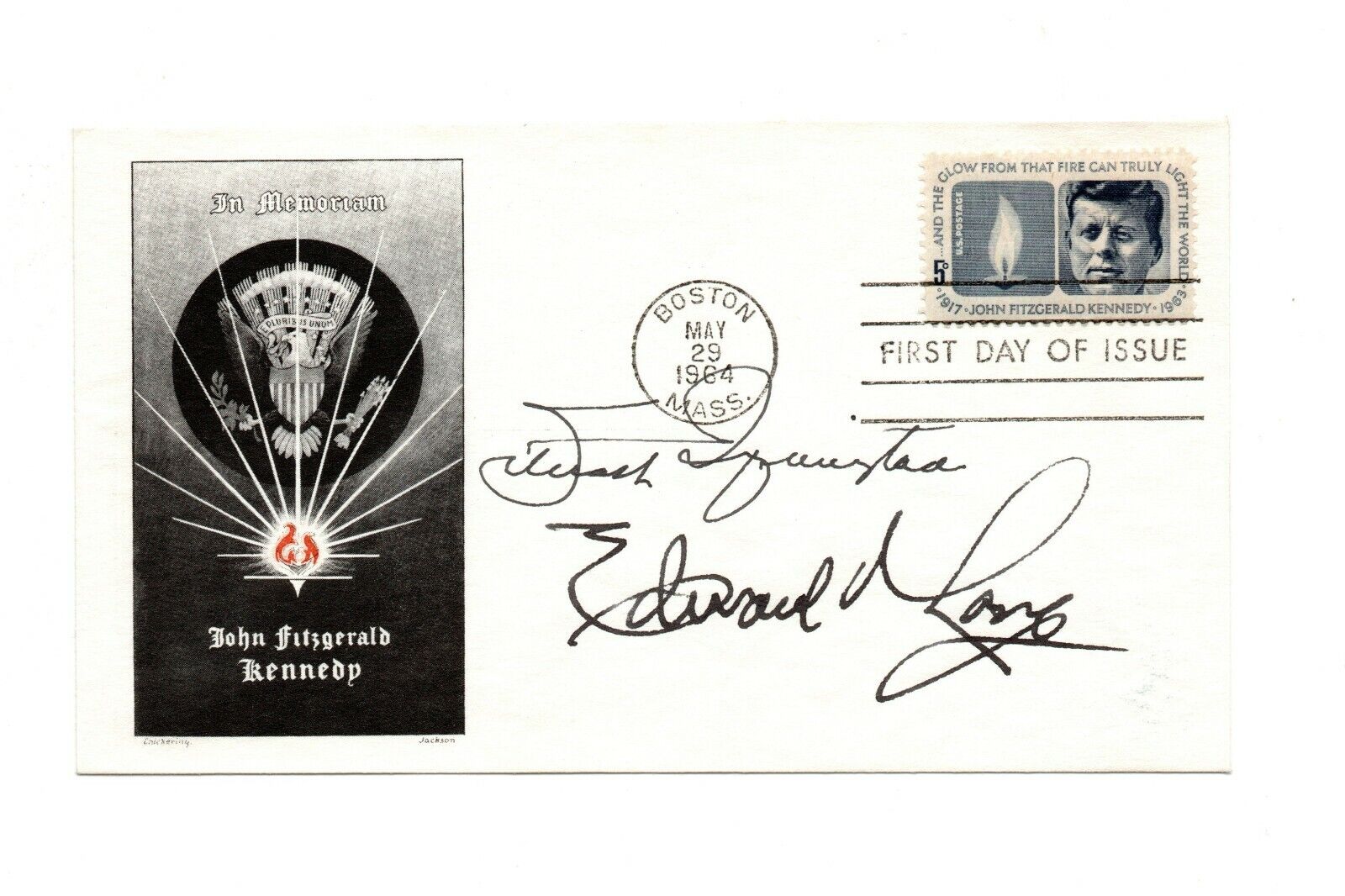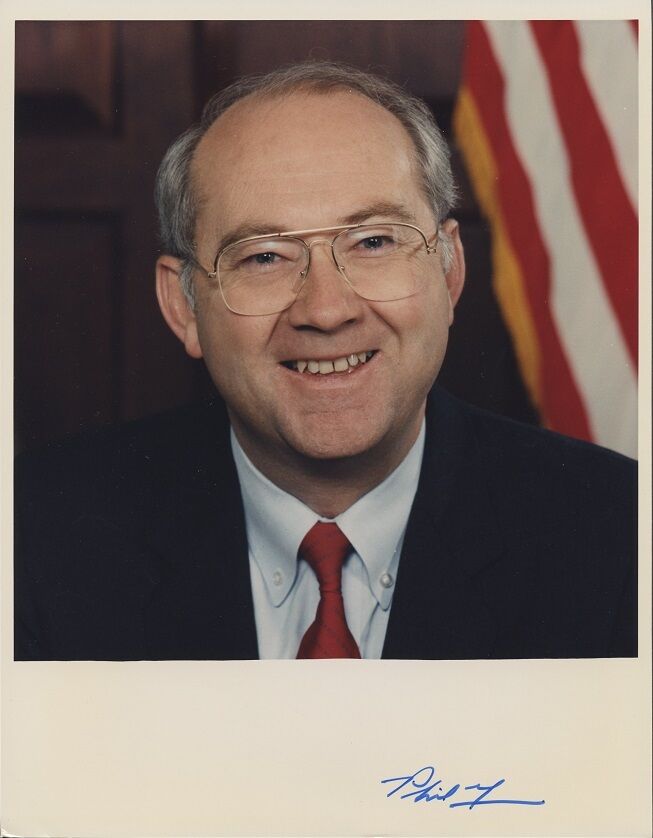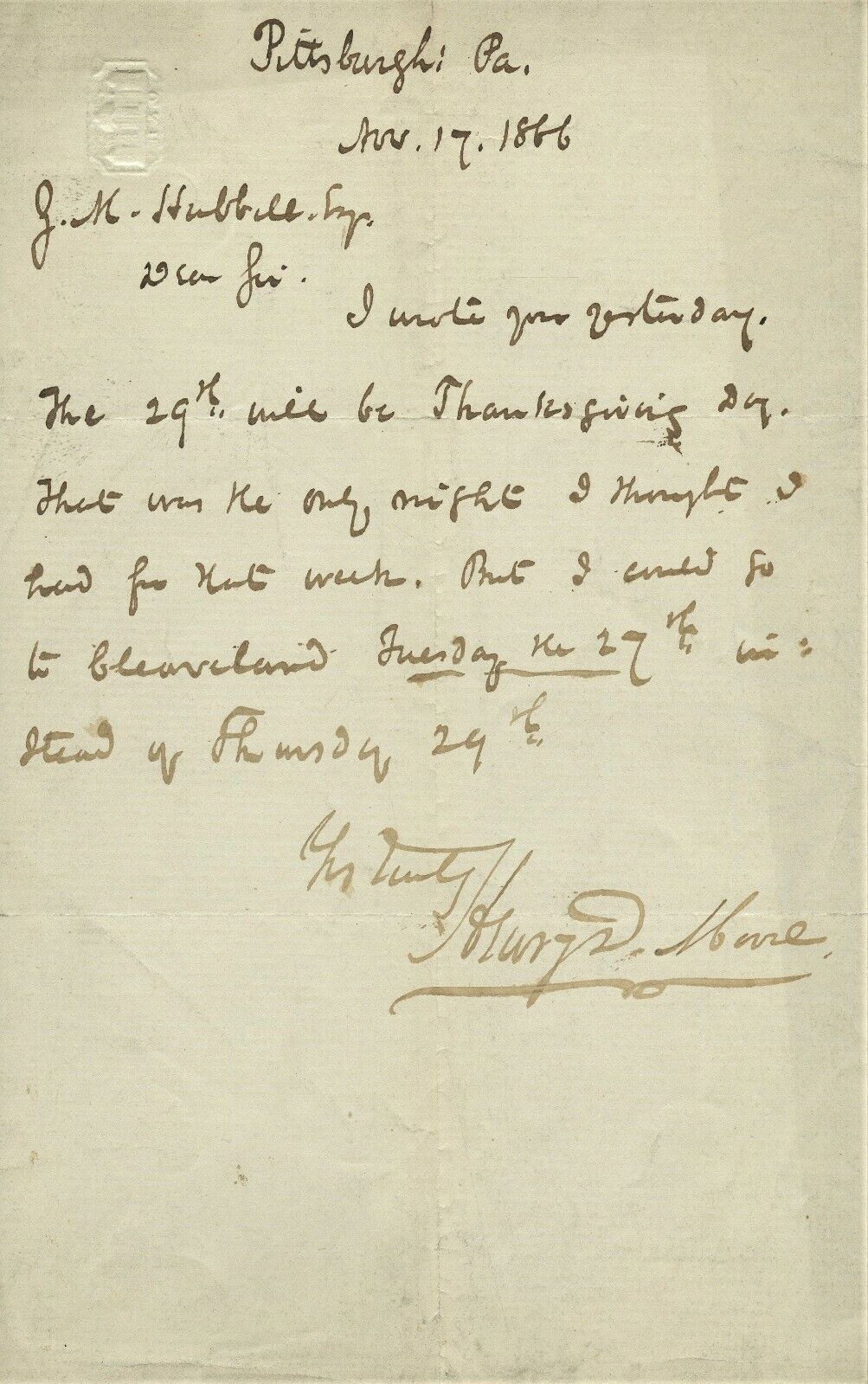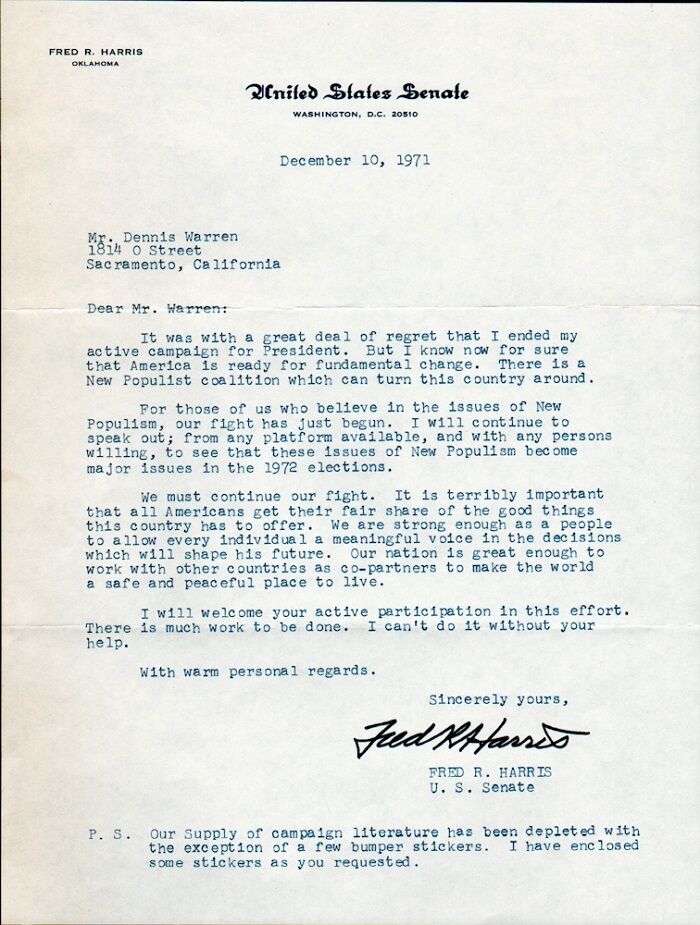-40%
GOVERNOR CIVIL RIGHTS CONGRESSMAN NJ FBI AGENT CAHILL 70s AUTOGRAPH SIGNED CARD!
$ 7.92
- Description
- Size Guide
Description
WILLIAM T. CAHILL(1912 - 1966)
46
th
GOVERNOR OF NEW JERSEY 1970-1974,
PRO-CIVIL RIGHTS US REPUBLICAN PARTY CONGRESSMAN FROM NJ 1959-1970,
MEMBER OF THE NEW JERSEY GENERAL ASSEMBLY 1951-1953,
SPECIAL DEPUTY ATTORNEY GENERAL OF THE STATE OF NEW JERSEY IN 1951,
FIRST ASSISTANT PROSECUTOR OF CAMDEN COUNTY 1948-1951,
CITY PROSECUTOR OF CAMDEN, NJ 1944-1945,
&
SPECIAL AGENT OF THE FEDERAL BUREAU OF INVESTIGATION (FBI) 1937-1938.
During Cahill’s gubernatorial term, he introduced the New Jersey State Lottery, passage of no-fault auto insurance, and played a vital role in bringing the New York Giants from Yankee Stadium to a new field in the Hackensack Meadowlands.
Opposition to his tax proposals and corruption charges against associates limited him to one term as governor. Seeking a second term, he was defeated in the Republican primary -- the only time he lost an election for public office.
"I always considered it a civic duty to get involved,"
Gov. Cahill said in a 1988 interview.
"But I also said to myself, Once the people tell me they don't want me, that's it. I'm out.' "
<
<>
>
HERE’S AN OFFICIAL STATE OF NEW JERSEY EXECUTIVE DEPARTMENT AUTOGRAPH CARD SIGNED BY CAHILL.
The document measures 4½” x 3” and is in very fine condition.
A FINE PIECE OF NEW JERSEY POLITICAL HISTORY TO ADD TO YOUR AUTOGRAPH, MANUSCRIPT & EPHEMERA COLLECTION!
<>>
::
<<>
BIOGRAPHY of the HONORABLE
WILLIAM T. CAHILL
William Thomas Cahill
(June 25, 1912 – July 1, 1996) was an American
Republican Party
politician
who served as the
46th
Governor of New Jersey
, from 1970 to 1974, and who represented
New Jersey
's
1st congressional district
in the
U.S. House of Representatives
from 1959 to 1967 and the state's
6th district
from 1967 to 1970.
Biography
Born in
Philadelphia
to Irish immigrant parents, Cahill moved to
South Jersey
with his family in 1919. He attended
Camden Catholic High School
in
Camden, New Jersey
, and graduated in 1929. Afterwards, Cahill graduated St. Joseph's College (now
Saint Joseph's University
) at Philadelphia in 1933. He returned to Camden to study at the
Rutgers School of Law - Camden
, receiving his law degree in 1937.
In 1937 and 1938, Cahill was a special agent of the
Federal Bureau of Investigation
. In 1939 he was admitted to the bar and began his political career. Living in
Collingswood, New Jersey
, Cahill was the city prosecutor of
Camden, New Jersey
in 1944 and 1945, was the first assistant prosecutor of
Camden County
from 1948 to 1951 and was a special deputy attorney general of the State of New Jersey in 1951. Cahill was a member of the
New Jersey General Assembly
from 1951 to 1953. Cahill was elected to the
Eighty-sixth
and to the five succeeding Congresses. During his tenure in the US House, Cahill voted for the
Civil Rights Act of 1964
and the
Voting Rights Act of 1965
. He served in the until resigning to assume his seat as governor, serving from January 3, 1959 to January 19, 1970. Throughout his tenure in Congress and as governor, Cahill was widely viewed as a moderate Republican.
Tenure as governor
In
1969
, Cahill ran for
Governor of New Jersey
, facing off against Democrat
Robert B. Meyner
, who had previously held the office from 1954 to 1962. Cahill defeated Meyner and became New Jersey's first Republican governor in 16 years.
Cahill served as governor from January 20, 1970 to January 15, 1974, and assumed office with a Republican-controlled legislature to support him. Among his accomplishments as governor were new automobile emission standards, an increase in the sales tax from 3 to 5 percent, the introduction of the
state lottery
, and the passage of no-fault auto insurance. He also played a role in bringing the
New York Giants
from
Yankee Stadium
to a new field in the
Hackensack Meadowlands
.
On Thanksgiving Day 1971, two months after the
Attica State prison riots
in upstate New York, a similar rebellion rose at
Rahway State Prison
. The revolt was quieted without violence, and Cahill's role in ending the conflict was widely commended. Cahill also appointed a commission that recommended the creation of a state income tax, which proved to be controversial with voters. The proposal was defeated in July 1972, but a state income tax was finally instituted four years later, after Cahill left office.
In spite of his many successes and accomplishments as governor, Cahill's term was derailed by scandal. In 1972,
Secretary of State
Paul J. Sherwin was convicted for fixing a 0,000 state highway contract with a contractor who returned the favor with ,000 to Cahill's associates. Then, in April 1973, former
New Jersey Republican State Committee chairman
Nelson G. Gross
and
State Treasurer
Joseph McCrane, who had been finance chairman for Cahill's 1969 campaign, were both charged with illegally making campaign donations to the governor as tax deductions. Both men were convicted the following year. Although investigators were unable to implicate Cahill in either affair, his reputation suffered as a result of these setbacks.
Cahill ran for re-election in
1973
. Damaged by the scandals in his administration, he was defeated in the Republican primary election by the more conservative Congressman
Charles Sandman
, who went on to lose the general election to Democrat
Brendan Byrne
. During his final months as governor, Cahill named his predecessor, Democrat
Richard J. Hughes
, as chief justice of the
New Jersey Supreme Court
.
After his term as governor, Cahill was a senior fellow at the
Woodrow Wilson School of Public and International Affairs
at
Princeton University
from 1974 to 1978.
Death
Cahill died at his daughter's house in
Haddonfield, New Jersey
on July 1, 1996 of
peripheral artery disease
. He was interred at Calvary Cemetery in
Cherry Hill Township, New Jersey
.
The William T. Cahill Center for Experiential Learning and Career Services at
Ramapo College
in
Mahwah, New Jersey
was dedicated in his honor on September 10, 1997.
I am a proud member of the Universal Autograph Collectors Club (UACC), The Ephemera Society of America, the Manuscript Society & the American Political Items Collectors (APIC) (member name: John Lissandrello). I subscribe to each organizations' code of ethics and authenticity is guaranteed. ~Providing quality service & historical memorabilia online for over twenty years.~
WE ONLY SELL GENUINE ITEMS, i.e., NO REPRODUCTIONS, FAKES OR COPIES!
Campaign
